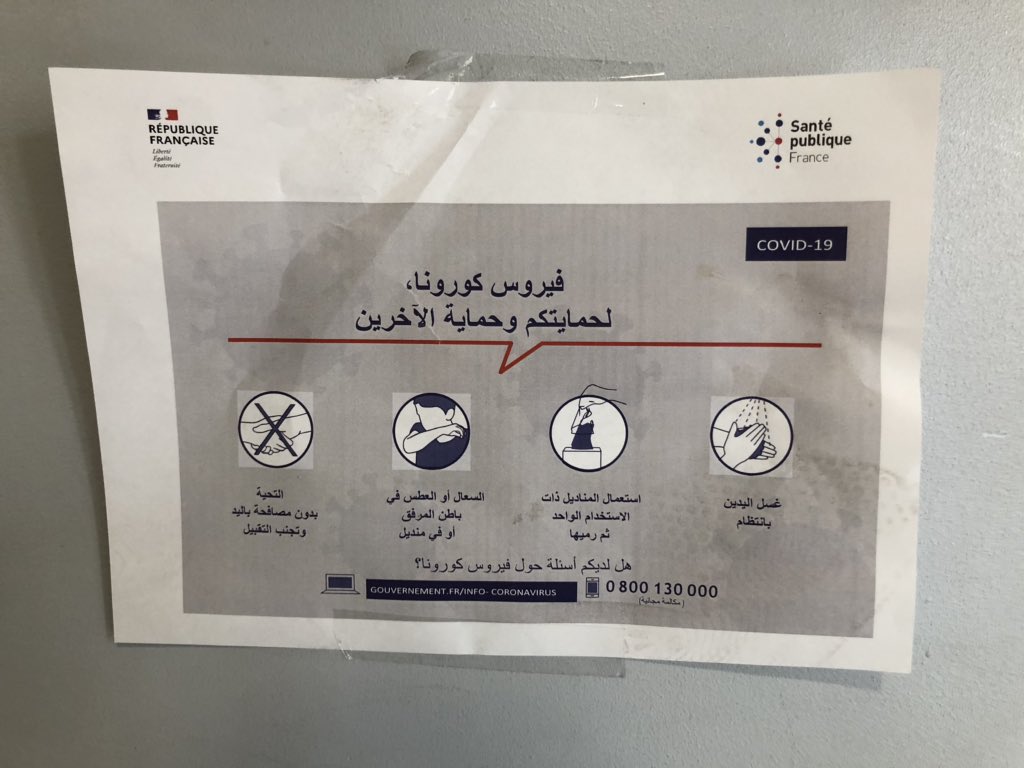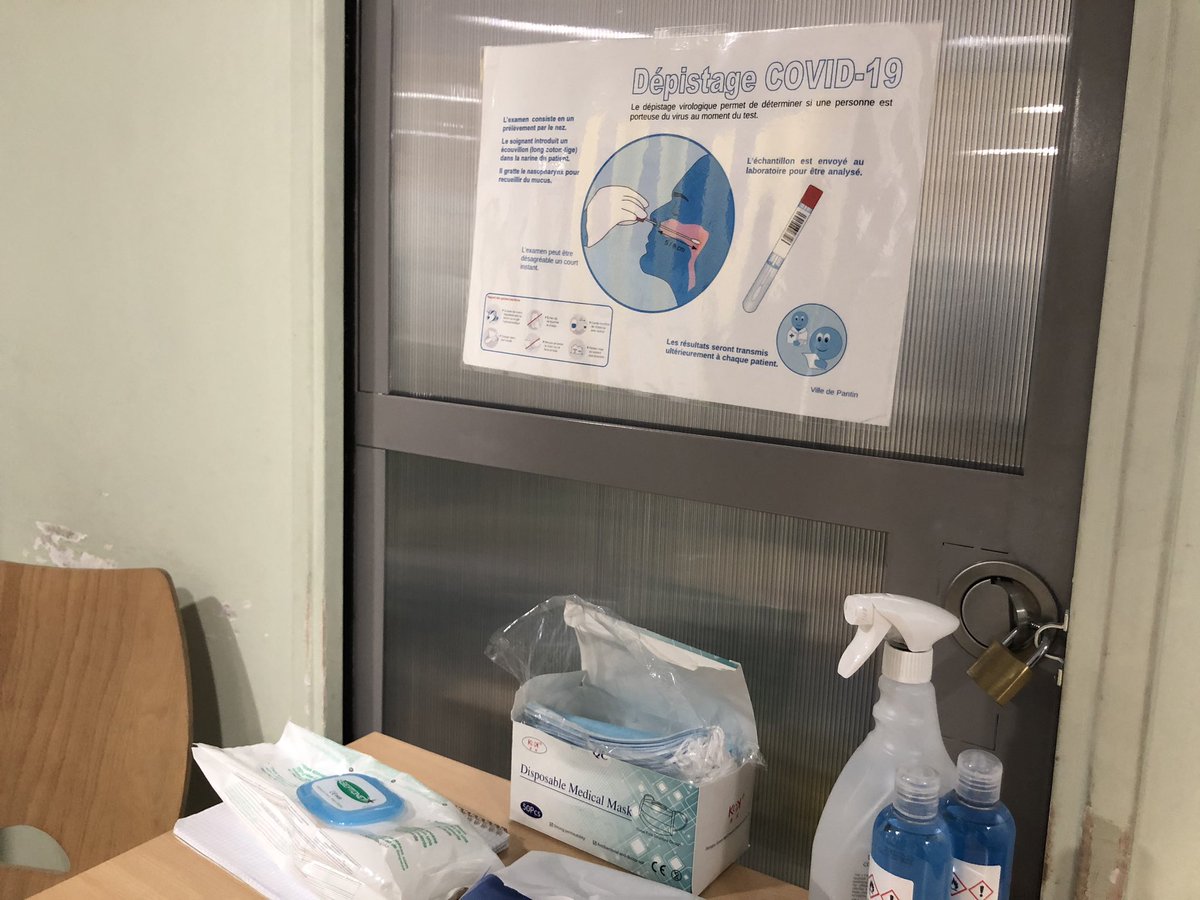To prevent a #coronavirus resurgence, #France is ‘testing, tracing and isolating’, hoping to nip any new source of contagion in the bud. This week I went for @TheLocalFrance to see how the plan is playing out in practice. Thread.
In the greater Paris region, regional health authority @ARS_IDF regularly install pop-up centres incentivise people to get tested, on the spot, free of charge and without appointment.
“We wanted to be as close as possible to the people,” the regional health director said.
“We wanted to be as close as possible to the people,” the regional health director said.
Usually the pop-up centres are actual tents, temporarily set up in key areas to be easily spotted by people in the neighbourhood. The goal is to reach people who wouldn’t necessarily get tested otherwise.
This centre is in Pantin, a town in France’s poorest département, Seine Saint-Denis. It’s well known to people in the area as a place to get a hot meal, a shower, or health advise. On Thursday, everyone who came by was offered a #Covid_19 test.
Arsem, 44, was brave enough to both take the test and to let me sit in on it. “They asked me if I wanted to, so I said yes,” he said.
“No corona?”
“I don’t know, we’ll have to wait and see,” said Emma, 20, a medicine student who was working at the centre in Pantin that day.
“I don’t know, we’ll have to wait and see,” said Emma, 20, a medicine student who was working at the centre in Pantin that day.
The chair is disinfected between each person, and Emma and her colleagues wear layers of protective equipment. “Arms, robe, a surgical mask, the glasses and a hat,” she said.
The tests are sent to a lab and the results come back in a day or two. About 0.80 percent of the total tests in Seine Saint-Denis have come back positive, the number for the whole Paris region is 0.72 percent.
Seine Saint-Denis is France’s poorest department, densely populated and with a high proportion of key workers who couldn’t easily work from home during lockdown. As a result, coronavirus spread like wildfire, pushing the mortality rate up 130 percent.
Testing aggressively in SSD is crucial to avoid a second wave, but few people here go regularly to the doctor. Nassira, 39, said she and her daughter Aya, 10, would “probably not have gotten tested” if they hadn’t been asked at the centre in Pantin.
Nassira and her two children live in a foyer (social housing complex) in Aubervilliers, a neighbouring town to Pantin. They spent the lockdown inside, no a balcony or garden to breathe fresh air from. Aya is epileptic. The confinement period “was really tough,” Nassira said.
Aya really didn’t want to get a q-tip up her nose, but she was a real little hero while it happened. (Much les yelling from her than the grown men that did the test after, just saying.)
Over the past weeks, Seine Saint-Denis’ coronavirus rates have dropped alongside the rest of the country. Both #Covid_19 ICU numbers and hospital admissions have been slashed in half since early April.
This follows a national trend that largely can be explained by the strict lockdown, but also (as there hasn’t been a spike in cases in the weeks since France began to lift the lockdown) by the national testing programme. More than 200 clusters have been detected since May 11th.
The lockdown didn’t work as well in SSD as in the rest of France, not because - as some claimed - the people here didn’t follow the rules. “The problem was not that the inhabitants did not want to confine themselves, they couldn’t,” the @ARS_IDF health director told us.
Why SSD had a hard time self-confining is better explained in the full article (link below). Poverty, high density and a high proportion of key workers pretty much sums it up.
To reach the whole population, health authorities work with community groups to spread the word that they can get tested at the pop-up centers. Crucially, they advertise in several languages. General health advice in Arabic at the centre in Pantin:
Arsem had lunch before getting tested. He said the pop-up test centres were a “good initiative”, because many of the people there that day were homeless and unlikely to seek out medical assistance themselves.
One doctor told me: “Because the state has failed the people here, Seine Saint-Denis has become an epidemic threat to France. If things get out of control here, it can harm everyone. That’s why they need to implement a strategy of positive discrimination.”
That said, the pop-up centre strategy includes the whole Paris region. “We also target areas without social problems, but we try to focus on places where people have little access to medical help,” said Luc Ginot, the regional health director.
Aren’t you scared to get the virus, I asked Emma. “Honestly, no. Seeing as I have a mask, and I’m being careful, disinfecting my hands twice between each person. It should be fine,” she said, adding, “otherwise I wouldn’t do it.”
After Arsem got tested, he was given a mask, a bottle of hand sanitiser and a note reminding him to come back on Monday to get his results. (He’s going to text me what they are, fingers crossed!)
This was part of a @soljourno project that @TheLocalFrance has been taking part in, exploring solutions to the #coronavirus crisis and how well they work. For more, see the full article: https://www.thelocal.fr/20200619/how-france-is-trying-to-prevent-a-coronavirus-resurgence-in-its-poorest-suburbs

 Read on Twitter
Read on Twitter









